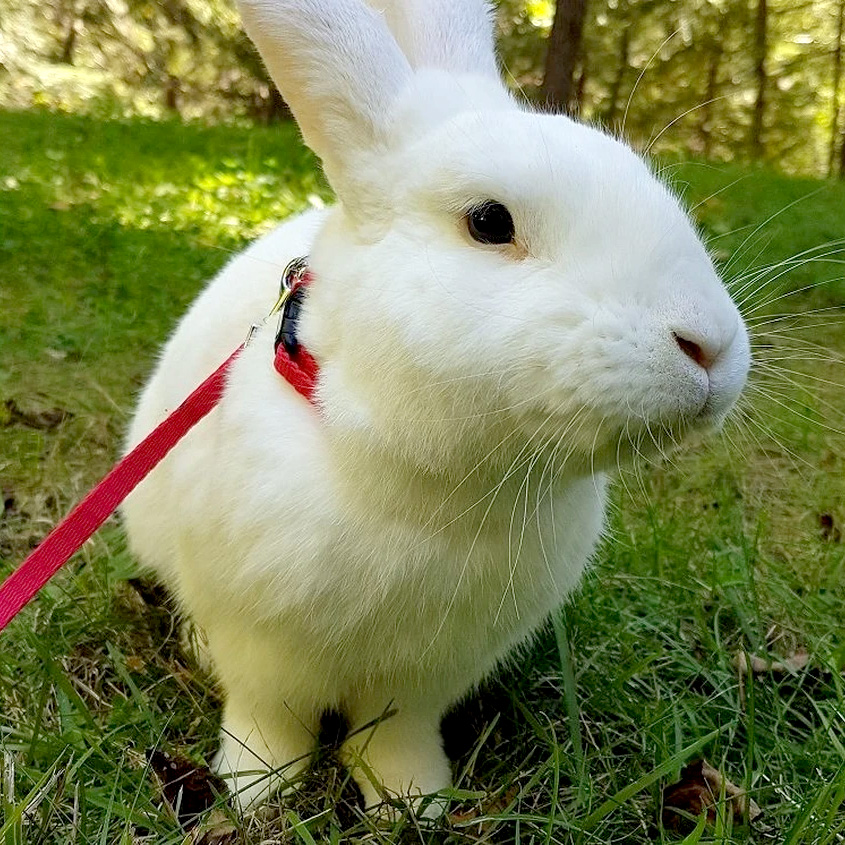
Bunnies require years-long commitment, but are excellent pets to right home
Toronto Sun
By: Laura Shantora Nelles
Hippity hoppity, Easter’s on its way. There are plenty of ways to celebrate the upcoming vernal equinox and delight in the first signs of spring and while a chocolate rabbit may make its way into your basket this year, a pet rabbit makes a terrible Easter gift.
In the weeks and months following Easter every year, unwanted rabbits are discarded at shelters, rescues or worse — outside. While these adorable animals make poor gifts, they are excellent pets for the right home, but it’s important to research whether a rabbit is right for you.
Many of their natural instincts, such as digging and chewing, can be disastrous to human living spaces if they’re not properly bunny proofed. (Keep your phone chargers far from little teeth; those ‘spicy twigs’ are enticing!) Rabbits can also become aggressive if they are not spayed or neutered, but they can be amazing companion animals when given what they need to flourish.
Lisa Winn, co-founder of Ladybird Animal Sanctuary in Hamilton, said one of the most important components to rabbit care is proper housing — which can include an exercise pen, their own bunny-proofed room or free-roaming. Despite what a pet store may try to sell you, “They can’t be in a cage; they need to be a part of the family. They need time out of their enclosure.”
While all rabbits need room to hop, binky (a charming sign of a happy bun jumping and twisting mid-air) or flop over and relax, some large breeds, such as Flemish giants, can weigh more than 10 pounds and need large spaces to exercise and play.
Finding a long-eared pal with the right personality is important to create a happy environment for humans and animals alike. Some are good with kids, some aren’t. Some are cuddly, others are not. Winn explained, “Some don’t mind being picked up, but others don’t like it.” In the wild, a rabbit being picked up is one about to be eaten, so four paws on the ground is the preference for many. Rabbits can be timid or shy, happy, playful or aloof. Just like a dog or a cat, each has its own personality.
Another important consideration when choosing a rabbit for a pet is ensuring there’s a suitable vet nearby — rabbits are considered “exotic” pets and most vets don’t see rabbits. “You can plan it all out, go get all the things and get the rabbit and then find out the nearest vet is two hours away,” said Winn. Having a good clinic nearby is vital to the well-being of a bunny as they are prey animals and will do their best to hide signs of injury or illness, “And sometimes when you notice, it can be too late.”
WHAT’S ON THE MENU?
Contrary to what Bugs Bunny might say, carrots are not a staple of rabbit diets — their three main food groups are hay, greens and pellets. Elana Trainoff, manager of partnerships and animal services at Toronto Animal Services, said the bulk of a rabbit’s diet should always be hay, which is imperative for dental and digestive health. “Fresh hay needs to be available day and night.” Timothy hay is recommended, but mixing other types like oat or orchard grass can give some variety. Trainoff recommended putting hay in at least two places inside the rabbit’s enclosure, including in the litter box. “They poop and eat at the same time,” she said.
Small amounts of pellets can be given once or twice a day as well as fresh greens, including lettuce and herbs. Pro tip: If you grow herbs, bunny poop makes an excellent fertilizer. Trainoff said an “occasional fruit treat” is also OK — banana is often a favourite.
Bunnies also need enrichment, including toys, things to chew on or maybe a friend, as Trainoff said “they can get lonely.” Whether that interaction comes from a rabbit or human friend, many rabbits are playful and enjoy stacking cups, puzzles and willow balls. They can also become bonded with another rabbit. “It’s always amazing to bond,” said Trainoff. “But the bonding process can take time.” (Bonding is not guaranteed to work, however, so adopting a pre-bonded pair may be a good option.)
Rabbits are crepuscular animals, meaning they are most active around dawn and dusk, great for people who work during the day, as that’s when your bun is most likely to sleep. A cosy hidey house, which can be as simple as a large cardboard box, gives a sense of safety and security while they doze. A relaxed rabbit might even flop over on its side to sleep — and give humans a scare.
Winn stressed, “It’s important to do research not just on the internet, but reach out to rescues and people who know.” Adopting a rabbit from a shelter or rescue can be a good option as the organizations typically have an idea of the rabbit’s personality and can give insight into whether this rabbit will be a good fit for a particular home.
Ladybird Animal Sanctuary and Toronto Animal Services offer foster-to-adopt programs to ensure a good match. “Shelter behaviour is not indicative of their behaviour at home,” said Trainoff, adding it can take time for a rabbit to become fully comfortable in a new place. Spending time sitting on the floor and getting the rabbit comfortable around humans is a good place to start.
There are many rabbits waiting to be adopted and it’s often red-eyed white or black buns waiting the longest. And if you’re not quite ready for a years-long commitment, foster applications are always welcome.













